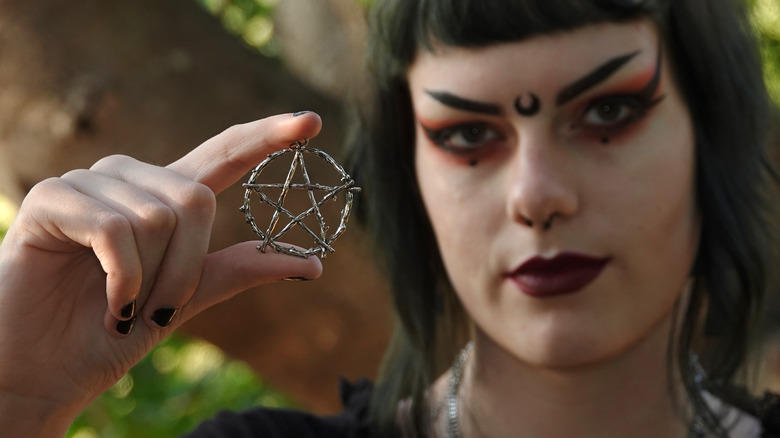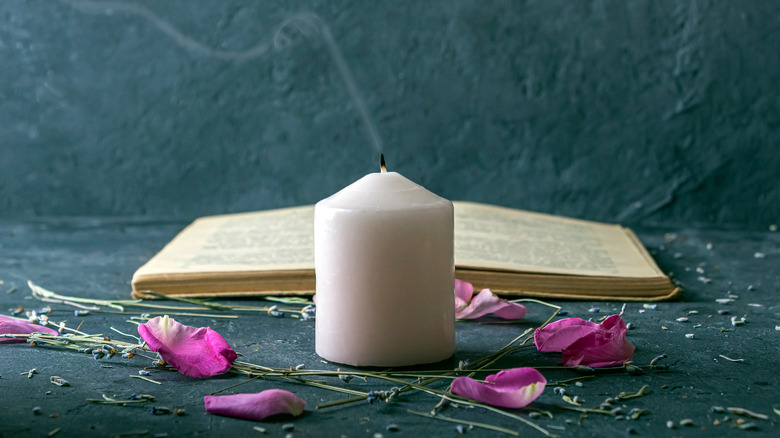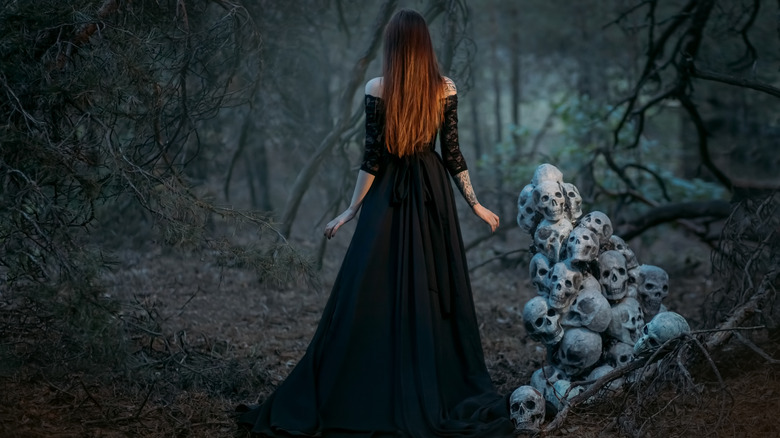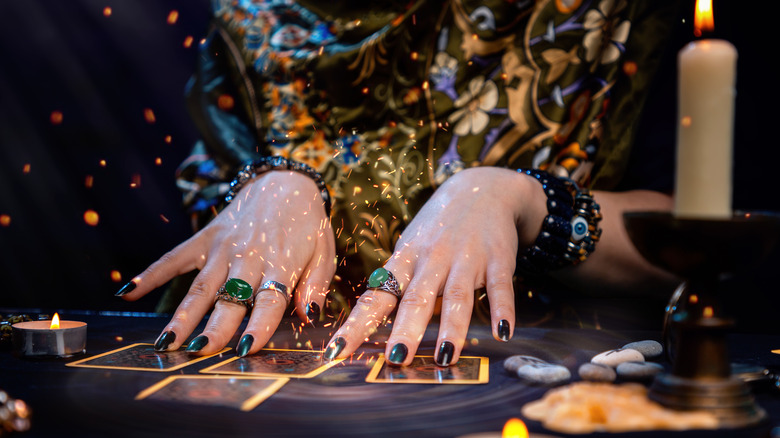Pagan Vs. Wiccan: What's The Difference?
Spooky season is upon us, which means it's time to delve into the deeper meaning of all things witchy and wonderful. If you've recently developed an interest in the witchcore aesthetic, you have the fundamental building blocks needed to understand what this corner of the world is all about. One of the easiest ways to expand your knowledge is to learn the difference between paganism and Wicca, as the two are different despite being closely linked with one another. Similar to the ways in which Wicca is different from witchcraft, being a pagan and being a Wiccan are contained within the same wheelhouse but entail different practices and rituals.
According to History, Wicca is considered a pagan-based ritual, which is where the general confusion between the two stems from. Wicca is a religion that's oriented around nature, but many of the practices derive from pre-Christian beliefs (per Dictionary.com). Conversely, paganism is a religious or spiritual community based on the worship of nature itself.
Since both forms of expression are centered around Mother Earth, you'd be forgiven for interchanging the two. But if you want to fully embrace one practice over the other, it's important to learn the principles of each to ensure you're making an informed decision. Grab your tarot cards, crystals, and alter materials, and let's get started!
Paganism is often used as a blanket term for several different faiths
Though the term "pagan" often incites visuals of sacrifices and devil worship, the practice is actually derived from several different faiths, each of which lent a characteristic hand in defining this particular religion.
Pagans form their beliefs through a love of nature and a desire to worship the earth. They fall into one of two categories: polytheistic or ditheistic. Polytheistic entails worshipping numerous deities, whereas ditheistic involves worshipping only two deities — a god and a goddess (per Blessed Be Magick). This is similar to both the Romans and the Greeks, who worshipped gods and goddesses and were committed to revering the natural world.
The etymology behind the word pagan lends additional perspective on the matter, as it was originally used to define any person of non-Christian or non-Jewish faith during the 14th century (per Etymonline). If someone lived in a rural area and committed to worshipping gods and goddesses in addition to their land, they were considered pagan. Nowadays, paganism encompasses a variety of beliefs, practices, and traditions, and varies from one part of the world to another.
In Scandinavia, the U.S., and the U.K., pagans worship both fertility and nature (per Dictionary.com). Common examples of pagan rituals include ceremonies in the woods where members recite poetry, perform sacred dramas, chant, pray, sing, dance, share food and beverages, and focus on their connection to nature (via BBC).
Wicca is closer to witchcraft than paganism
Wicca is a form of paganism, as both are nature-based religions. The practice of Wicca varies greatly from the practices of pagans though, which is why Wicca is more commonly tied to witchcraft. According to the BBC, the term "Wicca" was originally used to describe the tradition of witchcraft being practiced as a form of religion. When you're Wiccan, you worship many of the same gods and goddesses as pagans do, and many of the traditions are similarly derived from pre-Christian beliefs. However, the actual rituals and materials used by Wiccans are completely different from pagans, which is where the fundamental difference between the two lies.
Wiccans often form covens and practice magic together, particularly during crucial moments in nature, such as the Winter Solstice, Summer Solstice, and the solar equinoxes (per History.com). Many of these rituals are performed outside at night, as Wiccans typically like to draw power from the moon and use this energy to effect positive change and healing. Wiccans live by an ethical code and they believe we have the ability to influence the things that happen to us (via BBC).
The Wicca religion was first established by Gerald Gardner in the 1940s after he was recruited by a nearby coven to learn their practices and ways of worship. Gardner then created the Wiccan calendar that's still used today to delineate the festivals and dates of joint worship to maximize the members' connection with nature and each other (per BBC News).
Pagans and Wiccans use different materials to complete their religious rituals
Pagan rituals can be performed on your own or when you're in a group of other practicing members. These rituals are often performed to celebrate the seasons, attune oneself with nature, worship chosen deities, and obtain healing properties from the earth around you (via Journal of Humanistic Psychology). To perform a Pagan ritual, you'll need to cast a magic circle, commonly referred to as a sacred space, which is demarcated with items such as rocks, candles, or salt.
A magic circle can be created anywhere, either inside or outside, but it should be used to establish a clear boundary between yourself and the world around you while the ritual is taking place. From there, you use certain objects and written symbols to draw power while you connect with nature, worship your deity, or seek healing on either a physical or emotional level.
For Wiccan practices, you'll need more tools, such as an altar, wand, chalice, incense, candles, tarot cards, and an athame (via Wicca Living). An athame is a ritual knife that is sometimes used in Pagan acts as well. Each of your Wiccan tools must be cleansed and consecrated before you use them, as this ensures their effectiveness and removes any energy existing from the previous owner. Many Wiccans recommend having one tool to represent each element, including Earth, Fire, Water, and Air (per Wicca Living).
As you can see, Wicca and paganism overlap in some areas and differ in others.



